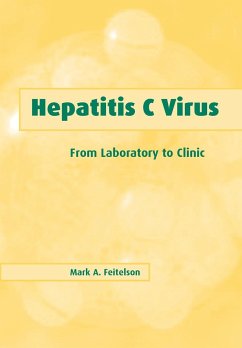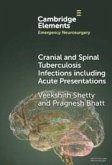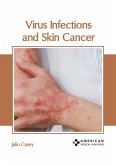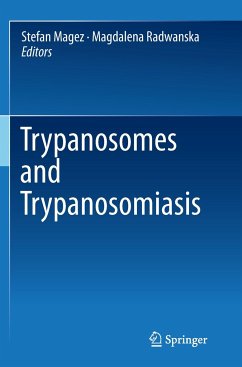Mark A. Feitelson
Hepatitis C Virus
Mark A. Feitelson
Hepatitis C Virus
- Broschiertes Buch
- Merkliste
- Auf die Merkliste
- Bewerten Bewerten
- Teilen
- Produkt teilen
- Produkterinnerung
- Produkterinnerung
An integrated, multidisciplinary account of the virus, its biology and clinical manifestations.
Andere Kunden interessierten sich auch für
![Cranial and Spinal Tuberculosis Infections including Acute Presentations Cranial and Spinal Tuberculosis Infections including Acute Presentations]() Veekshith ShettyCranial and Spinal Tuberculosis Infections including Acute Presentations69,99 €
Veekshith ShettyCranial and Spinal Tuberculosis Infections including Acute Presentations69,99 €![Last Chance Viral Phage Therapy Last Chance Viral Phage Therapy]() Martin ScottLast Chance Viral Phage Therapy19,99 €
Martin ScottLast Chance Viral Phage Therapy19,99 €![Virus Infections and Skin Cancer Virus Infections and Skin Cancer]() Virus Infections and Skin Cancer141,99 €
Virus Infections and Skin Cancer141,99 €![Trypanosomes and Trypanosomiasis Trypanosomes and Trypanosomiasis]() Trypanosomes and Trypanosomiasis112,99 €
Trypanosomes and Trypanosomiasis112,99 €![Emerging Neurological Infections Emerging Neurological Infections]() Emerging Neurological Infections165,99 €
Emerging Neurological Infections165,99 €![Antibiotic Therapy for Geriatric Patients Antibiotic Therapy for Geriatric Patients]() Thomas T. Yoshikawa (ed.)Antibiotic Therapy for Geriatric Patients76,99 €
Thomas T. Yoshikawa (ed.)Antibiotic Therapy for Geriatric Patients76,99 €![Pandemic Perspectives Pandemic Perspectives]() Howard BurtonPandemic Perspectives16,99 €
Howard BurtonPandemic Perspectives16,99 €-
-
-
An integrated, multidisciplinary account of the virus, its biology and clinical manifestations.
Hinweis: Dieser Artikel kann nur an eine deutsche Lieferadresse ausgeliefert werden.
Hinweis: Dieser Artikel kann nur an eine deutsche Lieferadresse ausgeliefert werden.
Produktdetails
- Produktdetails
- Verlag: Cambridge University Press
- Seitenzahl: 272
- Erscheinungstermin: 28. März 2002
- Englisch
- Abmessung: 244mm x 170mm x 15mm
- Gewicht: 475g
- ISBN-13: 9780521799591
- ISBN-10: 0521799597
- Artikelnr.: 21587963
- Herstellerkennzeichnung
- Libri GmbH
- Europaallee 1
- 36244 Bad Hersfeld
- gpsr@libri.de
- Verlag: Cambridge University Press
- Seitenzahl: 272
- Erscheinungstermin: 28. März 2002
- Englisch
- Abmessung: 244mm x 170mm x 15mm
- Gewicht: 475g
- ISBN-13: 9780521799591
- ISBN-10: 0521799597
- Artikelnr.: 21587963
- Herstellerkennzeichnung
- Libri GmbH
- Europaallee 1
- 36244 Bad Hersfeld
- gpsr@libri.de
Mark A. Feitelson, Ph.D. is currently Professor in the Department of Pathology, Anatomy and Cell Biology. He has a secondary appointment in the Department of Microbiology and Immunology and is a member of the Kimmel Cancer Center at Thomas Jefferson University. In addition, he is head of the Molecular Diagnostics Laboratory in Microbiology for Thomas Jefferson University Hospital. Prior to his transfer to Jefferson Medical College, Dr Feitelson trained with the nobel laureate Dr Baruch S. Blumberg at the Fox Chase Cancer Center. Dr Feitelson has been working on the biology and pathogenesis of hepatitis B for more than 20 years, and has recently started a similar research program in hepatitis C.
Preface
Part I. Basic Principles: 1. Background
2. The virus
3. Epidemiology and transmission
4. Natural history of infection
5. Pathogenesis of infection
6. HCV and hepatocellular carcinoma
7. Extrahepatic sites for hepatatis C
8. HCV and autoimmune diseases
9. Clinical aspects of the disease
10. Current therapeutic approaches
11. NS5A and interferon resistance
Part II. Recent Advances: 12. Propagation of virus in culture
13. Understanding the natural history of HCV
14. HCV animal models
15. Vaccine research
Part III. Experimental Approaches: 16. New systems to understand HCV biology
17. New antiviral screening assays
18. Antiviral gene therapy
Part IV. Protocols and Techniques: 19. Sample collection, preparation and storage
20. HCV RNA in blood and tissue samples
21. HCV RNA genotypes and quasispecies
22. Replication of HCV in tissue culture
23. NS3 protease, helicase and NTPase
24. Characterization of NS5B
Part V. Outstanding Questions and Emerging Areas for Investigation
References
Index.
Part I. Basic Principles: 1. Background
2. The virus
3. Epidemiology and transmission
4. Natural history of infection
5. Pathogenesis of infection
6. HCV and hepatocellular carcinoma
7. Extrahepatic sites for hepatatis C
8. HCV and autoimmune diseases
9. Clinical aspects of the disease
10. Current therapeutic approaches
11. NS5A and interferon resistance
Part II. Recent Advances: 12. Propagation of virus in culture
13. Understanding the natural history of HCV
14. HCV animal models
15. Vaccine research
Part III. Experimental Approaches: 16. New systems to understand HCV biology
17. New antiviral screening assays
18. Antiviral gene therapy
Part IV. Protocols and Techniques: 19. Sample collection, preparation and storage
20. HCV RNA in blood and tissue samples
21. HCV RNA genotypes and quasispecies
22. Replication of HCV in tissue culture
23. NS3 protease, helicase and NTPase
24. Characterization of NS5B
Part V. Outstanding Questions and Emerging Areas for Investigation
References
Index.
Preface
Part I. Basic Principles: 1. Background
2. The virus
3. Epidemiology and transmission
4. Natural history of infection
5. Pathogenesis of infection
6. HCV and hepatocellular carcinoma
7. Extrahepatic sites for hepatatis C
8. HCV and autoimmune diseases
9. Clinical aspects of the disease
10. Current therapeutic approaches
11. NS5A and interferon resistance
Part II. Recent Advances: 12. Propagation of virus in culture
13. Understanding the natural history of HCV
14. HCV animal models
15. Vaccine research
Part III. Experimental Approaches: 16. New systems to understand HCV biology
17. New antiviral screening assays
18. Antiviral gene therapy
Part IV. Protocols and Techniques: 19. Sample collection, preparation and storage
20. HCV RNA in blood and tissue samples
21. HCV RNA genotypes and quasispecies
22. Replication of HCV in tissue culture
23. NS3 protease, helicase and NTPase
24. Characterization of NS5B
Part V. Outstanding Questions and Emerging Areas for Investigation
References
Index.
Part I. Basic Principles: 1. Background
2. The virus
3. Epidemiology and transmission
4. Natural history of infection
5. Pathogenesis of infection
6. HCV and hepatocellular carcinoma
7. Extrahepatic sites for hepatatis C
8. HCV and autoimmune diseases
9. Clinical aspects of the disease
10. Current therapeutic approaches
11. NS5A and interferon resistance
Part II. Recent Advances: 12. Propagation of virus in culture
13. Understanding the natural history of HCV
14. HCV animal models
15. Vaccine research
Part III. Experimental Approaches: 16. New systems to understand HCV biology
17. New antiviral screening assays
18. Antiviral gene therapy
Part IV. Protocols and Techniques: 19. Sample collection, preparation and storage
20. HCV RNA in blood and tissue samples
21. HCV RNA genotypes and quasispecies
22. Replication of HCV in tissue culture
23. NS3 protease, helicase and NTPase
24. Characterization of NS5B
Part V. Outstanding Questions and Emerging Areas for Investigation
References
Index.








